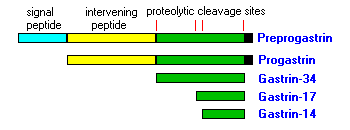VIVO Pathophysiology
Gastrin
Gastrin is a major physiological regulator of gastric acid secretion. It also has an important trophic or growth-promoting influence on the gastric mucosa. Gastrin is synthesized in G cells, which are located in gastric pits, primarily in the antrum region of the stomach and binds receptors found predominantly on parietal and enterochromaffin-like cells.
Structure of Gastrin and the Gastrin Receptor
Gastrin is a linear peptide that is synthesized as a preprohormone and is post-translationally cleaved to form a family of peptides with identical carboxytermini. The predominant circulating form is gastrin-34 ("big gastrin"), but full biologic activity is present in the smallest peptide (gastrin-14 or minigastrin). Further, full bioactivity is preserved in the five C-terminal amino acids of gastrin, which is known as pentagastrin. The five C-terminal amino acids of gastrin and cholecystokinin are identical, which explains their overlapping biological effects.

The gastrin receptor is also one of the receptors that bind cholecystokinin, and is known as the CCK-B receptor. It is a member of the G protein-coupled receptor family. Binding of gastrin stimulates an increase in intracellular Ca++, activation of protein kinase C, and production of inositol phosphate.
Control and Physiologic Effects of Gastrin
The primary stimulus for secretion of gastrin is the presence of certain foodstuffs, especially peptides, certain amino acids and calcium, in the gastric lumen. Also, as yet unidentified compounds in coffee, wine and beer are potent stimulants for gastrin secretion. Secretion of this hormone is inhibited when the lumenal pH of the stomach becomes very low (less than about 3).
Gastrin appears to have at least two major effects on gastrointestinal function:
- Stimulation of gastric acid secretion: Gastrin receptors are found on parietal cells, and binding of gastrin, along with histamine and acetylcholine, leads to fully-stimulated acid secretion by those cells. Canine parietal cells have roughly 44,000 gastrin receptors each, and in that species, it has been demonstrated that immunoneutralization of gastrin blocks secretion of acid in response to intragastric administration of peptides. Enterochromaffin-like (ECL) cells also bear gastrin receptors, and recent evidence indicates that this cell may be the most important target of gastrin with regard to regulating acid secretion. Stimulation of ECL cells by gastrin leads to histamine release, and histamine binding to H2 receptors on parietal cells is necessary for full-blown acid secretion.
- Promotion of gastric mucosal growth: Gastrin clearly has the ability to stimulate many aspects of mucosal development and growth in the stomach. Treatment with gastrin stimulates DNA, RNA and protein synthesis in gastric mucosa and increases the number of parietal cellsAnother observation supporting this function is that humans with hypergastrinemia (abnormally high blood levels of gastrin) consistently show gastric mucosal hypertrophy.
In addition to parietal and ECL cell targets, gastrin also stimulates pancreatic acinar cells via binding to cholecystokinin receptors, and gastrin receptors have been demonstratede on certain populations of gastric smooth muscle cells, supporting pharmacologic studies that demonstrate a role for gastrin in regulating gastric motility.
Disease States
Excessive secretion of gastrin, or hypergastrinemia, is a well-recognized cause of a severe disease known as Zollinger-Ellison syndrome, which is seen at low frequency in man and dogs. The hallmark of this disease is gastric and duodenal ulceration due to excessive and unregulated secretion of gastric acid. Most commonly, hypergastrinemia is the result of gastrin-secreting tumors (gastrinomas), which develop in the pancreas or duodenum.
Send comments to Richard.Bowen@colostate.edu

